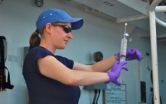(Press-News.org) Patients who are fed more calories while in intensive care have lower mortality rates than those who receive less of their daily-prescribed calories, according to a recent study of data from the largest critical care nutrition database in the world.
"Our finding is significant as there have been a number of previous studies in the area of critical care nutrition that have produced conflicting clinical recommendations and policy implications," says study lead Daren Heyland, a professor of Medicine at Queen's, director of the Clinical Evaluation Research Unit at Kingston General Hospital, and scientific director of the proposed Technology Evaluation in the Elderly Network. "Since caloric delivery is essential for improving the chances of these critically ill patients, it's vital that we know what the optimal level is."
Dr. Heyland's team examined the records of 7872 mechanically ventilated, artificially fed patients in 352 ICUs in 33 countries. They found that patients receiving at least two-thirds of their prescribed calorie intake had reduced mortality rates when compared with patients receiving less than one-third of their prescribed calorie intake. The researchers identified that the optimal caloric intake was about 80 to 85 per cent of total prescribed calorie intake.
World-wide, patients in ICUs typically receive 50 to 60 per cent of their prescribed calories so efforts to improve caloric delivery are important to improve the chances of critically ill patients surviving their illness.
In a further study, Dr Heyland and his research team examined the use of supplemental intravenous nutrition, in addition to the traditional use of feeding tubes. They concluded that efforts to improve the delivery of nutrition delivered via a feeding tube into the stomach are more important than the use of supplemental intravenous nutrition.
INFORMATION:
These respective findings were both recently published in Critical Care Medicine, a leading US-based ICU journal.
Dr. Heyland is leading a proposed initiative called the Technology Evaluation in the Elderly Network (TECH VALUE NET). More than 40 researchers from across Canada have come together to improve the care of seriously ill, elderly patients and their families through the development, evaluation and ethical implementation of a broad range of health care technologies, including nutrition strategies.
Calorific controversy for intensive care patients
2011-10-06
ELSE PRESS RELEASES FROM THIS DATE:
Reliant Technology Announces IBM Cost Reduction System
2011-10-06
Reliant Technology would like to announce the new IBM Cost Reduction System, a strategic cost reduction strategy for IBM customers with limited budgets and growing data storage costs. Reliant Technology has created this system to help enterprises find cost-saving IBM storage solutions that will meet the data demands of the future despite stagnant or declining IT budgets.
IBM customers can depend on Reliant Technology for competitive prices on used IBM equipment, IBM upgrades, IBM SAN equipment, replacement disks, and tape drives. Reliant Technology offers IBM DS3000, ...
To win hearts and minds, focus on small projects, study finds
2011-10-06
U.S. efforts to bring stability to Iraq and Afghanistan in recent years have focused less on killing insurgents and more on gaining the cooperation of the local population. But does this population-centered approach to counterinsurgency actually work?
A study published today (October 4, 2011) in the Journal of Political Economy finds evidence that it does.
The study, by economist Eli Berman (University of California, San Diego) and political scientists Jacob Shapiro (Princeton) and Col. Joseph Felter (Stanford), focused on the Commander's Emergency Response Program ...
Partnership focuses on developing East Coast fever vaccine
2011-10-06
This press release is available in Spanish.
A vaccine that protects cattle against East Coast fever, a destructive disease in eastern and central Africa, is being developed by scientists at the U.S. Department of Agriculture (USDA) and the International Livestock Research Institute (ILRI) in Kenya.
Entomologist Glen Scoles, veterinary medical officer Massaro Ueti and research leader Don Knowles at the Agricultural Research Service (ARS) Animal Disease Research Unit (ADRU) in Pullman, Wash., have been working on the collaborative project for more than five years. ARS ...
Scientists identify microbes responsible for consuming natural gas in Deepwater Horizon spill
2011-10-06
In the results of a new study, scientists explain how they used DNA to identify microbes present in the Gulf of Mexico following the Deepwater Horizon oil spill -- and the particular microbes responsible for consuming natural gas immediately after the spill.
Water temperature played a key role in the way bacteria reacted to the spill, the researchers found.
Proceedings of the National Academy of Sciences (PNAS) published the results in this week's journal.
David Valentine and Molly Redmond, geochemists at the University of California at Santa Barbara (UCSB) conducted ...
Researchers question key quality measure for asthma
2011-10-06
AURORA, Colo. -- Researchers studying the first national quality measure for hospitalized children have found that no matter how strictly a health care institution followed the criteria, it had no actual impact on patient outcomes.
The scientists examined 30 hospitals with 37,267 children admitted for asthma from 2008 to 2010 and discovered that the quality of discharge planning made no difference to the rate of return to the hospital for another asthma attack in 7, 30 or 90 days.
"Our research concluded that there is no relationship between compliance with this measure ...
Prison education programs reduce inmate prison return rate, University of Missouri study shows
2011-10-06
COLUMBIA, Mo. -- According to the Pew Research Center, one in one hundred American adults is currently in prison. U.S. Department of Justice statistics show that 67 percent of those inmates will recidivate, or re-offend and return to prison after they are released. Now, a University of Missouri researcher has found that educating inmates and preparing them to find jobs upon their release from prison greatly reduces their recidivism rate.
Jake Cronin, a policy analyst with the Institute of Public Policy in the Truman School of Public Affairs at the University of Missouri, ...
TGen/Virginia G. Piper Cancer Center publish results of new drug for pancreatic cancer patients
2011-10-06
SCOTTSDALE, Ariz. -- Patients at Virginia G. Piper Cancer Center Clinical Trials at Scottsdale Healthcare were the first in the nation to participate in a clinical trial to determine the safety, tolerability and effectiveness for usage of a new drug combination consisting of a standard drug called gemcitabine and a drug called nab-paclitaxel for patients with advanced pancreatic cancer.
The results of this study, headed by renowned pancreatic cancer expert Dr. Daniel Von Hoff, were published online Oct. 3, 2011, in the prestigious Journal of Clinical Oncology.
Nab-paclitaxel ...
New tool helps identify prostate cancer patients with highest risk of death
2011-10-06
Fox Chase Researchers Develop a New Tool That Helps Identify Prostate Cancer Patients with the Highest Risk of Death
MIAMA BEACH, FL (October 4, 2011)––After a prostate cancer patient receives radiation treatment, his doctor carefully monitors the amount of prostate-specific antigen, or PSA, in his blood. An increase in PSA, called biochemical failure, is the first detectable sign of the cancer's return to the prostate. Fox Chase Cancer Center researcher have found that the time between the last radiation treatment and biochemical failure can accurately predict a patient's ...
Fox Chase Gleason scores better predict prostate cancer's recurrence after radiation
2011-10-06
MIAMA BEACH, FL (October 4, 2011)––In a new study led by Fox Chase Cancer Center radiation oncologist Natasha Townsend, M.D., researchers have found that Gleason scores determined by pathologists at Fox Chase Cancer Center more accurately predict the risk of recurrence than Gleason scores from referring institutions. She presented the new research at the 53rd Annual Meeting of the American Society for Radiation Oncology on Monday, October 3.
When a man is diagnosed with prostate cancer, his tumor is assigned a Gleason score – a number between 2 and 10 indicating the ...
Study shows looking for job on Internet reduces unemployment time
2011-10-06
DENVER (Oct. 5, 2011) – A new study shows that using the Internet to look for a job reduces the time spent unemployed by an average of 25 percent.
The discovery directly contradicts a 2004 study showing that using the Internet actually prolonged unemployment.
"In 2004 the researchers came up with two scenarios for their findings – the Internet was not an effective tool or that people who looked on-line for jobs were not as qualified," said Hani Mansour, Ph.D., assistant professor of economics at the University of Colorado Denver who conducted the new study with Peter ...


